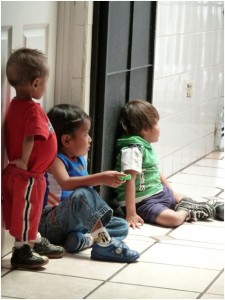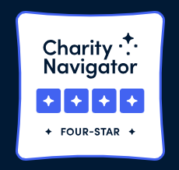Alex Kim blogs about his second trip to Guatemala as a Surgicorps International volunteer. Alex’s dad, Dr. David Kim, is leading the trip’s medical team this year.
Day One: Guatemala Screening
Upon arrival at the hospital, the lines of hopeful people waiting to be screened made it clear to us that we had a long day ahead. We greeted them all in a positive way but with some reserve, because we knew not all could be helped.
The hospital and orphanage were the same but different. Our orphanage tour was heart wrenching, even for team members who have been here previously.
During screening, each person had a role to play, and for the most part, none of us had hands to spare. While the medical volunteers were busy screening and diagnosing the patients, the rest of us (non-medical volunteers) were assisting with paperwork. In comparison to previous years, there seemed to be an increased number of unusual clinic cases that left even the most experienced surgeons somewhat baffled.
There were hundreds of patients eagerly waiting to be helped, but it felt like thousands. We heard countless somber stories from the indigenous families, some of whom had to travel about 20 hours seeking help. Stories included those of burns, severe accidents, and even machete incidents. Thankfully, each patient that was a candidate for surgery will receive help from only the best, giving an opportunity to create an improved life with brighter prospects.
Alex Kim
Day Two: Start of Surgery
The entire day the surgeons worked diligently with great reward, as every case produced exemplary results. Some of the surgical highlights included an intensive skin graft to restore a woman’s neck (which had been severely burned), the amputation of a pinky with a large growth protruding from it, and gallbladder removals. The non-medical volunteers spent their time working in both pre and post-op, in the baby orphanage, filing patient reports, and observing the surgeons at work. Although the surgeons worked long into the day (until 8:30 PM!), I felt they all were satisfied with their results and from knowing that their hard efforts greatly affect the lives of others for the better.
Day Three: Surgery Continues
Today was similar to yesterday with everything running smoothly. Even more non-medicals spent time in the baby orphanage and we were all, yet again, rather unwilling to depart from them, even after a few fell asleep in our arms.
 While one patient was being wheeled into the OR, we heard the unfortunate story behind his accident. This teenage boy is an orphan who was brought to the hospital by two nuns and had been involved in a fireworks accident. According to the nurses, it was around Christmas time when the fireworks exploded into his eye. The misfortune left him with scars around his face and a damaged eye. Worst of all, we were also informed that he has a terminal illness. Although life truly does not seem unfair sometimes, we hope that this surgery will be the first step in a positive direction.
While one patient was being wheeled into the OR, we heard the unfortunate story behind his accident. This teenage boy is an orphan who was brought to the hospital by two nuns and had been involved in a fireworks accident. According to the nurses, it was around Christmas time when the fireworks exploded into his eye. The misfortune left him with scars around his face and a damaged eye. Worst of all, we were also informed that he has a terminal illness. Although life truly does not seem unfair sometimes, we hope that this surgery will be the first step in a positive direction.
Day Four: The Volcano Hike
Today the non-medical volunteers were invited to climb one of the wondrous (active) volcanoes of Guatemala. As soon as we stepped out of the van, we were instantly swarmed by hungry children asking to buy their products. While we knew we couldn’t help them long term, we did what we could; we gave them the food we brought with us.
The hike itself was rather difficult but the sights at the end were well worth it. Our tour guide was a 66 year old man with four grandchildren. And, to our surprise, he was well ahead of us the entire climb. While we stopped to catch our breath, he would laugh and ask why the task was so difficult. Even on the way down from the top, our guide was in a full out sprint. The fact that we were all struggling to keep up with a man four times our age was slightly discouraging, but we were all able to laugh at the experience.
Day Five: A Familiar Face in the Orphanage
We are past the halfway point of this trip and everyone, especially the non-medicals, has found a particular role. I spent a good portion of time in the baby orphanage again today and I had a realization.
Last year, there was an older girl in the orphanage with a clear spinal disorder who was too delicate to play with. I recognized that same girl today, except instead of being penned away, she was strapped into a wheelchair.
Most of the children at the “orphanage” actually have families. Since many children are malnourished, their families only drop off their children to be fed until they are healthy. However, since that girl was still there, she does not have a family.
Despite her disabilities, she was aware of our presence and laughed whenever I was making another baby laugh. She will most likely stay on in the hospital facilities for the duration of her life, but she is getting excellent care.
Day Six: Goodbyes
During the last day in the hospital, everything ran smoothly. The Surgicorps members assumed their own roles whether it was in the operating room, recovery room, the wards, or in the orphanage. Many patients operated on earlier in the week returned for wound checks and dressing changes. 
The day was filled with excitement to see the results, mostly by the parents. Much to the delight of everyone, each and every patient – we completed approximately 100 surgeries — had a great outcome. We all felt joy but also sorrow since we had to say goodbye to the hospital staff and patients’ families. The non-medicals bid farewells to the children in the orphanage but not without tears in our eyes.
In the evening, everyone gathered for a farewell dinner in which we honored Dave Fortun with a scrub shirt signed by the entire team. This award is named after Tony Demos, the first recipient, given to an individual who displays excellence and selfless dedication. We also recognized Linda Esposto for her diligence, kindness and for all the work that she has done for the Guatemalan team, patients and others around the world. Both Dave and Linda received long standing ovations.
Day Seven: New Outlooks & Return Home
The last day was spent travelling back to the United States. As we went our separate ways, the sad realization that we may not ever see each other again occurred to us all. However, it was the experience that we shared that we will keep forever.
We will think back to our memories of Guatemala, the people, and how we helped them. These trips truly change people for the better. Every volunteer is left with a better outlook on life. Even veterans of these trips will admit that each journey is a new learning experience.
Most of all, we can all find comfort in knowing that we helped another life. From life altering surgery to simply feeding a child, each gesture benefitted someone in need.
Alex


